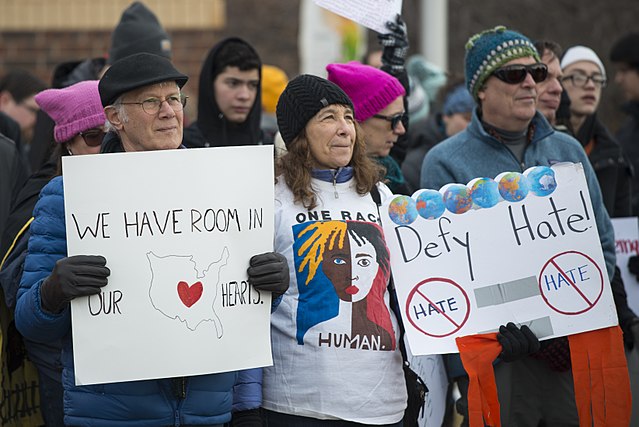- 14 3402-5578
- Rua Hygino Muzy Filho, 737, MARÍLIA - SP
- contato@latinoobservatory.org
 Foto: Fibonacci Blue from Minnesota, USA - Protest in support of immigrants
Foto: Fibonacci Blue from Minnesota, USA - Protest in support of immigrants
With the end of Title 42, a controversial public health policy implemented by the Trump administration in response to the Covid-19 pandemic, there is a general wonder what the potential impact of President Biden's new immigration policies is in this context.
Title 42 would require U.S. Customs and Border Protection (CBP) to immediately expel migrants apprehended at the border without giving them the opportunity to seek asylum or other forms of protection. The policy has been criticized by human rights groups and immigration advocates for denying vulnerable migrants the legal right to seek refuge in the United States and putting them at risk of harm in their home countries.
President Biden promised to end the use of Title 42, but he didn't. In the interim, his administration has implemented several other immigration policies aimed at addressing the root causes of migration and providing more humane treatment to migrants entering the United States. This includes expanding access to legal immigration, increasing resources for asylum processing, and improving conditions for detained migrants.
NBC News outlined some of the policies and requirements
the Biden administration is using or has announced it plans to use when Title
42 ends on Thursday:
●
Replace Title 42 with Title 8, the section of the U.S. law dealing
with immigration and nationality that was used at the borders before the
pandemic.
●
Levy penalties allowed under Title 8 from $50 to $250 in fines and
six months to two years in prison for each attempt to cross the border without
legal permission and twice the fines for anyone previously fined or imprisoned.
Penalties are more severe if a person has a criminal record and re-enters the
country illegally. Title 42 had suspended those penalties, which led to an
increase in the number of people who repeatedly crossed the border after they
had been expelled.
●
Require anyone who wants to apply for asylum to make an
appointment through the CBP One phone app. The number of appointments available
per day through the app expands from about 800 to about 1,000, and appointments
can be made 23 hours a day.
●
Toughen rules about asylum so applications are open only to people
who can show they applied to third countries and were rejected and that they
tried to make appointments through CBP One. The tougher rules propose some
exceptions for unaccompanied children, people in imminent danger and certain
trafficking victims.
●
Allow 30,000 Haitians, Venezuelans, Nicaraguans and Cubans per
month who have U.S. sponsors to apply for humanitarian parole in the U.S. Those
who qualify get to work in the country for two years.
●
Add asylum officers and immigration judges to expedite processing
times. Conduct "credible fear interviews" of people asking for asylum
earlier in the process and provide legal services so removals can be expedited.
●
Deploy 1,500 active-duty military personnel to help Border Patrol
with processing paperwork.
●
Bring in thousands of contractors and non-uniformed employees to
support administrative tasks usually done by Border Patrol agents.
●
Expand Border Patrol capacity for holding migrants and increase
Immigration and Customs Enforcement removal flights, doubling and tripling some
for certain countries.
● Open processing centers in countries where people can apply for legal immigration to the U.S., Canada, Spain and other countries, among other measures.
The story suggests that the Biden administration's new policies can help mitigate the damage caused by Title 42, especially for vulnerable populations such as unaccompanied minors and families with young children. NBC also notes that some experts believe the end of Title 42 could lead to an increase in border crossings and create challenges for the administration to manage.
The fate of Title 42 is likely to be a key issue in the ongoing debate over U.S. immigration policy and that the Biden administration will need to carefully balance public health concerns with its obligations under international law to protect the rights of migrants and refugees.











